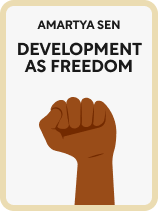

This article is an excerpt from the Shortform book guide to "Development as Freedom" by Amartya Sen. Shortform has the world's best summaries and analyses of books you should be reading.
Like this article? Sign up for a free trial here .
What’s the Lee thesis? Why does it claim that authoritarianism helps poor nations better than democracy does?
Amartya Sen claims in Development as Freedom that democracy is the solution to helping poor economies, but the Lee thesis states otherwise. The thesis states that authoritarianism eradicates poverty because of a focus on economic development rather than freedom.
Let’s look at what Sen has to say about the Lee thesis and whether authoritarianism really is the answer to economic prosperity.
The Lee Thesis
Some opponents of democracy in developing countries echo the “Lee thesis,” named for former Prime Minister of Singapore, Lee Kuan Yew. It states that authoritarian regimes are better at enriching poor nations than democracies.
Proponents of the Lee thesis attribute this to an authoritarian focus on economic development rather than on freedom, which is seen as unnecessary to eradicating poverty. For example, Singapore, South Korea, and China achieved higher growth while under authoritarian governments than did democracies like India, Costa Rica, and Jamaica.
However, Sen states that the Lee thesis is based on faulty evidence. Empirical studies reveal there’s no relationship between authoritarianism and economic growth. By contrast, democratically-oriented policies are proven growth drivers.
Examination of the “East Asian Miracle” economies (such as Japan, Singapore, Taiwan, and South Korea), which achieved rapid economic growth in the 20th century, suggests the following policies are most helpful:
- Openness to competition
- Use of global markets
- High literacy rates
- Land reforms
- Incentives for industrialization, research and development, and exports
Sen argues all of these helpful policies are compatible with democratic rights. Additionally, many authoritarian regimes that have failed to adopt these policies have remained poor. Therefore, the assertion that authoritarianism is either necessary or sufficient to achieve economic growth is false.
The Benefits and Drawbacks of the Reign of Lee Kuan Lew
The “Lee Kuan Yew Conundrum,” or the ability of Singapore’s authoritarian regime to govern effectively, provides a rebuttal to Sen’s view that democracy is an essential part of development.
Since 1965, Singapore’s per capita income has grown from $500 to $55,000. Bloomberg ranks Singapore as the healthiest nation in the world. It’s also considered one of the least corrupt, and its crime rates are substantially lower than those in the US.
Singapore has managed to accomplish these advances despite its poor record on democratic rights and civil liberties. While some contend that Singapore shows that democratic rights are overrated, Sen argues that the policies Singapore adopted are consistent with democracy. He further states that the Lee thesis is incorrect because the people of Singapore would be even better off if democracy were established.
Do the Poor Value Democracy?
Another argument made against democracy is that most people in underdeveloped nations don’t want it. Instead, they’re too concerned with putting food on the table to worry about voting rights or other tenets of democracy.
However, Sen contends that it’s hard to tell what average people in authoritarian regimes desire. This is because they lack the means of expressing their honest opinions without the freedom of speech and a free press. When people in poor countries do have the means to give their opinions honestly, Sen contends they opt for democracy.

———End of Preview———
Like what you just read? Read the rest of the world's best book summary and analysis of Amartya Sen's "Development as Freedom" at Shortform .
Here's what you'll find in our full Development as Freedom summary :
- The five types of freedom that are integral to economic development
- How democracy can prevent famine
- How empowering women helps communities






